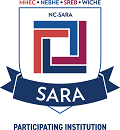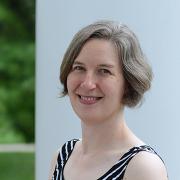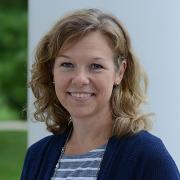
About this Program
The online multidisciplinary studies in education program consists of a thoughtful balance of courses, purposefully designed to deliver high-quality learning experiences while accommodating the busy schedule of teaching professionals.
Program Overview
Tuition & Fees
Funding Opportunities
National Board Certification Prep Program
Relevant. Credible. Fully online.
To successfully meet the needs of students in today’s public schools, an educator must have a much broader pedagogy than what was needed in past generations. A multidisciplinary studies in education master’s degree will satisfy many early career needs of today’s educator by:
• Providing the essential knowledge and in-demand skills needed for today’s diverse classrooms.
• Increasing knowledge in designing curriculum, implementing research-based instructional strategies and developing leadership capacity.
• Providing flexibility in designing a plan of study suited to one’s individual academic and professional goals.
Class are offered fully online, which provides students with flexibility and the convenience of working at home, while still allowing students and faculty to engage in rich conversations about teaching and learning. Our small class sizes and discussion-based courses encourage high levels of engagement.
The multidisciplinary studies program earns its name from the unique course sequence that allows graduate students to take courses across three educational programs (curriculum and instruction, reading specialization and educational leadership). Students also complete foundational classes focusing on topics such as curriculum, technology, diversity and educational research. Finally, with adviser approval, students have the option to select courses from graduate programs in other disciplines to create a highly individualized program that aligns with career goals.
Our expert faculty and adjuncts are accomplished professionals in the field of education. Courses balance theory and practice in order to provide relevant, purposeful experiences that address current topics in education.
All graduate students in the multidisciplinary studies in education program are required to have regular access to a PreK-12 classroom throughout their program in order to successfully complete course assignments and the capstone research project. Students who are not currently teaching may work with a local school to volunteer or observe in a classroom. Applicants are responsible for meeting all requirements for school volunteers, as determined by the individual school and/or district. Please note that this program does not lead to teacher certification.
The Hood Education Department is recognized by the Maryland State Department of Education as an approved educator preparation program provider.
Please note the Multidisciplinary Studies in Education master's program is not open to F1 students.

Hood College participates in the State Authorization Reciprocity Agreements.
Degrees Offered
- MS
Are you ready to go further?
For students applying to the multidisciplinary studies in education M.S. program, please submit the following to the Graduate School:
- Online graduate application.
- One copy of official transcripts from the institution where the highest degree was conferred.
- A short essay (approx. 500 words) describing how you anticipate the multidisciplinary studies in education graduate program will benefit you and your professional goals.
- Interview with program director.
Priority Application Deadlines:
- December 1: Spring semester application deadline
- May 20: Summer I session application deadline
- June 30: Summer II session application deadline
- August 15: Fall semester application deadline
Transfer credit policy for admitted students
Students may transfer a maximum of 6 graduate credits from an external, accredited institution, or another Hood graduate program prior to the first semester of study in the current program. Please review the full graduate transfer credit policy in the College catalog.
Program Requirements
Professional Education Core Courses (12 Credits)
| EDUC 502 | Technology for Teaching, Learning & Leadership | 3.0 |
| EDUC 577 | Introduction to Educational Research | 3.0 |
| EDUC 582 | Educational Philosophy in a Diverse Society | 3.0 |
| EDUC 583 | Principles of Curriculum Development & Appraisal | 3.0 |
| Total Credit Hours: | 12.0 | |
Masters Level Education Program Courses (9 credits)
Select one course from each of the following master's degree education programs.
| Total Credit Hours: | 9.0 |
Curriculum and Instruction (3 credits)
| EDUC 500 | Methods for Teaching Multilingual Learners | 3.0 |
| EDUC 511 | Children's Literature | 3.0 |
| EDMA 530 | Mathematics Education Leadership I | 3.0 |
| EDUC 530 | K-12 Blended Learning | 3.0 |
| EDUC 533 | Effective Home-School Interaction: Research & Practice | 3.0 |
| EDUC 534 | Current Issues in Early Childhood & Elementary Education | 3.0 |
| EDUC 535 | Integrating the Elementary Curriculum through Language Arts | 3.0 |
| EDUC 540 | Modern Science Methods | 3.0 |
| EDUC 542 | Topics in Elementary Physical & Earth Science | 3.0 |
| EDUC 544 | Topics in Elementary Life Science | 3.0 |
| EDUC 545 | Modern Mathematics Methods | 3.0 |
| EDUC 546 | The Teaching of Numbers,Operations & Algebraic Thinking in Elementary & Middle School | 3.0 |
| EDUC 547 | The Teaching of Geometry & Measurement in Elementary & Middle School | 3.0 |
| EDUC 551 | The Teaching of Geometry | 3.0 |
| EDUC 552 | The Teaching of Algebra | 3.0 |
| EDUC 553 | Foundations of Elementary STEM (Science-Technology-Engineering-Mathematics) Education | 3.0 |
| EDUC 561 | Teaching Diverse Learners in an Inclusive Setting | 3.0 |
| EDUC 565 | Classroom Organization & Management in Special Education | 3.0 |
| EDUC 571 | Historical, Philosophical & Legal Foundations of Special Education | 3.0 |
| EDUC 573 | Assessment, Diagnosis & Prescription in Special Education | 3.0 |
| EDUC 574 | Curriculum & Methods in Inclusive Classrooms: English Language Arts & Social Studies | 3.0 |
| EDUC 576 | Curriculum & Methods in Inclusive Classrooms: Math and Science | 3.0 |
| EDUC 581 | Research-Based Teaching, Learning & Assessment | 3.0 |
| EDUC 595 | The Teaching of Statistics & Probability: Decision Making with Mathematics | 3.0 |
| EDUC 596 | The Teaching of Mathematical Modeling: Strategies for Contemporary Problems | 3.0 |
Educational Leadership (3 credits)
| EDUC 513 | School Law | 3.0 |
| EDUC 514 | Administration of Student Services | 3.0 |
| EDUC 578 | Educational Leadership and Group Dynamics | 3.0 |
| EDUC 584 | Systemic Change Processes for School Improvement | 3.0 |
Reading Specialization (3 credits)
| EDUC 517 | Materials for Teaching Reading: Instruction & Methods | 3.0 |
| EDUC 518 | Reading Instruction: Elementary | 3.0 |
| EDUC 519 | Reading Instruction: Secondary | 3.0 |
| EDUC 520 | Reading Diagnosis | 3.0 |
| EDUC 521 | Contemporary Issues in the Teaching of Reading | 3.0 |
Elective Content Courses (12 credits)
Select courses to address individual needs and interests that will total 12 credit hours. These content courses can come from within the education department as well as from other content area departments. These graduate courses must be at the 500 level or higher, and the candidate must have course approval from both the advisor and program director and/or department chairperson which is offering the course.
| Total Credit Hours: | 12.0 |
Capstone (3 credits)
| EDUC 597A | Capstone Research Project | 1.5 |
| EDUC 597B | Capstone Research Project | 1.5 |
| Total Credit Hours: | 3.0 | |
Student & Alumni Testimonials
"Hood College gave me opportunities to expand my horizon by welcoming challenge and change—especially by working with students of all age levels." -Laurene Carlisle, M.S.'03
Earn Hood graduate credits as a non-degree student or apply them toward a related master's degree in education while completing the FCPS Vanguard Program.
This partnership program between the Frederick County Public School System and Hood College will teach, lead and coach others to create a blended learning environment in the classroom, while building capacity within schools and across the district.
Mindset
Mindset competencies include the core values or beliefs that guide an individual’s thinking, behaviors and actions, which align with the goals of educational change and mission. Educators need to commit to mindsets that help them shift toward new forms of teaching and learning.
Instructional Technology
Instructional technology skills help educators utilize technology in their lessons. The goal is to transform learning experiences so they result in higher levels of achievement for students. These skills are acquired and mastered through instruction, training and practice.
Teaching Practices
Teaching practice competencies are personal characteristics and patterns of behavior that help educators make the transition to new ways of teaching and learning. These qualities include integrating digital content, small group instruction, opportunities for student reflection and data-driven decision making.
Professional Learning and Networking
Professional learning and networking skills are general skills that apply across roles and subject areas. These skills—which include collaboration and problem solving—are complex; they help practitioners tackle new tasks or develop solutions in situations that require organizational learning and innovation.
18-24 Months
Average Completion Time
36 Total Credits
| Median Salary (Public Data) | Job Titles | Companies of Employment |
|---|---|---|
| $67,000 | Instructional Coordinator | Frederick County Public Schools |
| Academic Advisor | Montgomery County Public Schools | |
| Youth Program Director | Maryland State Department of Education | |
| Online Learning Facilitator | Hood College | |
| Assistant principal |
Program Contact

Program Director

Assistant Director of Graduate Admission

3MT Winner Spotlight | Kent Wetzel
“Three minutes is really fast. It feels like a thrill ride—it’s over before you realize it. You really need to think about the key highlights of your research and what you want to get across to your audience above all else.”
FCPS Board of Education Recognizes New National Board Certified Teachers
National Board Certification is an advanced professional certification for PreK-12 educators that is completely voluntary. The certification is based on a very difficult peer-reviewed and performance-based process that is similar to professional medical certifications.





